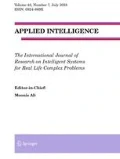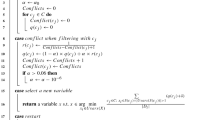Abstract
Scheduling problems can be viewed as a set of temporal metric and disjunctive constraints and so they can be formulated in terms of CSP techniques. In the literature, there are CSP-based methods which sequentially interleave search efforts with the application of consistency enforcing mechanisms and variable/ordering heuristics. Therefore, the number of backtrackings needed to obtain a solution is reduced. In this paper, we propose a new method that effectively integrates the CSP process into a limited closure process: not by interleaving them but rather as a part of the same process. Such an integration allows us to define more informed heuristics. These heuristics are used to limit the complete closure process to a maximum number of disjunctions, thereby reducing its complexity while at the same time reducing the search space. Some open disjunctive solutions can be maintained in the CSP process, limiting the number of backtrackings necessary, and avoiding having to know all the problem constraints in advance. Our experiments with flow-shop and job-shop instances show that this approach obtains a feasible solution/optimal solution without having to use backtracking in most cases. We also analyze the behaviour of our algorithm when some constraints are known dynamically and we demonstrate that it can provide better results than a pure CSP process.
Similar content being viewed by others
References
M.R. Garey and D.S. Johnson, Computers and Intractability: A Guide to the Theory of NP-Completeness, Freeman: New York, 1979.
N.M. Sadeh and M.S. Fox, “Variable and value ordering heuristics for the job-shop scheduling constraint satisfaction problem,” Artificial Intelligence Journal, vol. 86, no. 1, pp. 1–41, 1996.
J.C. Beck and M.S. Fox, “A generic framework for constraint-directed search and scheduling,” Artificial Intelligence Magazine, vol. 19, no. 4, pp. 101–129, 1998.
S. Albers and S. Leonard, “Online algorithms,” ACMComputing Surveys, vol. 31(3es), 1999.
A. Garrido, M.A. Salido, and F. Barber, “Scheduling in a planning environment,” in Proceedings of ECAI 2000 Workshop on New Results in Planning, Scheduling and Design, Berlin, 2000, pp. 36–43.
P. van Beek, “The design and experimental analysis of algorithms for temporal reasoning,” Journal of Artificial Intelligence Research, vol. 4, pp. 1–18, 1996.
A.K. Mackworth and E. Freuder, “The complexity of some polynomial network-consistency algorithms for constraint satisfaction problems,” Artificial Intelligence, vol. 25, pp. 65–74, 1985.
R. Dechter, “Studies in the use and generation of heuristics” Ph.D. Thesis, UCLA, Los Angeles, CA, 1985.
R. Dechter, “From local to global consistency,” Artificial Intelligence, vol. 55, pp. 87–107, 1992.
Y. Caseau and F. Laburthe, “Improving branch and bound for job-shop scheduling with constraint propagation,” in Proceedings of the Eighth Franco-Japanesse Conference, Brest, France, 1995.
S.F. Smith and C. Cheng, “A constraint-posting framework for scheduling under complex constraints,” in Proceedings Joint IEEE/INRIA Conference on Emerging Technologies for Factory Automation, Paris, France, Sept., 1995.
K. Stergiou and M. Koubarakis, “Backtracking algorithms for disjunctions of temporal constraints,” Artificial Intelligence, vol. 120, pp. 81–117, 2000.
F. Barber, “Reasoning on interval and point-based disjunctive metric constraints in temporal contexts,” Journal of Artificial Intelligence Research, vol. 12, pp. 35–86, 2000.
E. Schwalb and R. Dechter, “Processing disjunctions in temporal constraint networks,” Artificial Intelligence, vol. 3, nos. 1/2, pp. 29–61, 1997.
N. Sadeh, “Look-ahead techniques for micro-opportunistic job shop scheduling,” PhD thesis, Dept. of Computer Science, CMU-CS-91-102, Carnegie Mellon University, 1991.
P. Baptiste, C. Le Pape, and W. Nuijten, “Constraint-based optimization and approximation for job-shop scheduling,” in Proc. IJCAI-95Workshop on Intelligent Manufacturing Systems, Montreal, Canada, 22-25 August, 1995.
R. Dechter, I. Meiri, and J. Pearl, “Temporal constraint networks,” Artificial Intelligence Journal, vol. 49, pp. 61–95, 1991.
S.F. Smith and C. Cheng, “Slack-based heuristics for constraint satisfactions scheduling,” in Proceedings of the Eleventh National Conference on Artificial Intelligence, AAA-I, July, Washington DC, 1993, pp. 139–144.
A. Oddi and A. Cesta, “Incremental forward checking for the disjunctive temporal problem, in Proc. ECAI'00, 2000.
R. Dechter and D. Frost, “Backjump-based backtracking for constraint satisfaction problems,” Artificial Intelligence, vol. 136, pp. 147–188, 2002.
Y. Caseau and F. Laburthe, “Disjunctive scheduling with task intervals,” in Proceedings of the Eleventh International Conference on Logic Programming, MIT Press, 1994.
C. Cheng and S.F. Smith, “Generating feasible schedules under complex metric constraints,” in Proceedings AAAI-94, Seattle, WA, 1994.
R. Dechter, I. Meiri, and J. Pearl, “Temporal constraint networks,” in Proc. 1st International Conference of Principles of Knowledge Representation and Reasoning, Toronto, Ontario, 1989, pp. 83–93.
J. Carlier and E. Pinson, “An algorithm for solving the job-shop problem,” Management Science, vol. 35, no. 2, pp. 164–176, 1989.
J.C. Beck and M.S. Fox, “Dynamic problem structure analysis as a basis for constraint-directed scheduling heuristics,” Artificial Intelligence, vol. 117, pp. 31–81, 2000.
Rights and permissions
About this article
Cite this article
Alfonso, M.I., Barber, F. A Mixed Closure-CSP Method for Solving Scheduling Problems. Applied Intelligence 21, 173–193 (2004). https://doi.org/10.1023/B:APIN.0000033636.14272.95
Issue Date:
DOI: https://doi.org/10.1023/B:APIN.0000033636.14272.95




